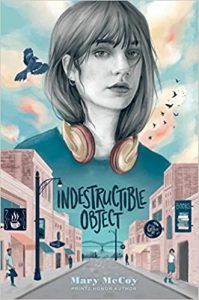
Amazon Affiliate Link | Bookshop.org Affiliate Link
Messy bisexuals, this one’s for you. ❤️
One of my favorite things to read about is flawed main characters. Characters who make mistakes–mistakes they really knew better than to make, but they did it anyways. I can’t stand negative reviews of books based on the protagonist having flaws, which is making me want to gather this book up to my chest and defend it from those negative reviews I can see looming. Lee is lost, she’s messy, and she’s hurt people–but she’s also finding herself and trying to work her way through them, and I am firmly in her corner.
Indestructible Object takes place in the summer between high school and university. Lee is an artist from a family of artists, and she has devoted herself to a podcast she makes with her boyfriend called Artists In Love. Her picture-perfect relationship and her passion both shatter simultaneously, though, when he breaks up with her to move to another city for university. Now she’s trying to figure out what to do with herself, and in her panic, she endangers the job she loves (doing sound for a cafe) as well as any chance she had of Vincent and her getting back together.
If the lost job, failed relationship, and finished podcast weren’t bad enough, her parents are separating. They haven’t been properly together for years, but they’re finally moving into separate places, and her mom is travelling while he packs up. That’s when Lee finds three objects that make her doubt the validity of her parent’s relationship in the first place: a passport belonging to her dad that was dated months before she was born, a hidden videotape of their engagement party that can’t find a VCR to play, and a book of poems by her mother dedicated with love to another man. She decides to start another podcast trying to put together the pieces of the mystery of her parents’ marriage. Why did they get together? Was there a fatal flaw to begin with? And if so, can Lee avoid it so she can find real, lasting love?
What Lee isn’t admitting about her relationship with Vincent is that it was never perfect. In fact, she was cheating on him with Claire from the coffee shop she worked at. She’s closeted, and she’s confused by Vincent’s disinterest in sex–it’s not an excuse, but her decisions make sense, especially while she’s struggling to understand herself. I appreciated this passage, as she admits to cheating to a queer friend who tells her she’s enacting a negative stereotype:
“That’s not fair,” I say. I’m not trying to defend what I’ve done, but I also don’t think I should be expected to model ideal bisexual behavior–whatever that is–at all times. When straight people cheated, they weren’t failing the whole straight population. They were just failing one person.
This could be considered a spoiler, but I think it’s important to note that Lee also realizes that she’s polyamorous and doesn’t want to be in a monogamous relationship. (She commits to honesty in her relationships going forward, of course!) It’s still very rare to see YA tackle polyamory, so I was happy to see that! (In fact, that’s what convinced me to pick this up in the first place.) My heart hurt for when she finally realizes what she really wants out of her life and she tears up because it’s “too much to want,” an impossible dream–at least, that’s what it seems to her.
I also thought Max’s subplot, the queer friend mentioned earlier, was fascinating. He has two queer parents, one of whom is non-binary, and when he came out as gay, they were–unsurprisingly–supportive, especially of his relationship with an idyllic boyfriend. Now, though, he has experienced sexual fluidity, falling for a girl, and he has picked up a punk aesthetic from her. His parents don’t approve, and he feels rejected now that he’s an “untidy queer” instead of what he refers to as a “Love, Simon gay.” This is a complicated queer story, which I am always here for–especially because I also experienced sexual fluidity after identifying as a lesbian for a decade, and it was a rough transition.
I also really enjoyed that this story is told partly in podcast transcripts, especially because they sounded like a podcast I would listen to. Lee is trying to do an investigative podcast of her own family history, but it isn’t so easy to sum up into a coherent narrative, especially the more she delves into it. It also foregrounds Memphis as the setting, digging into the problems and appeal of this city.
I’m going to leave you with a quotation near the end of the book, so it could theoretically be considered a spoiler, but I love it, so I’m including it.
Hearts are made for this. They’re made to be battered, filled up with big feelings, emptied out again. They’re made to swell and ache and break and piece back together again.
They’re made to be used, even if everything you’re ever going to use them for ends.
